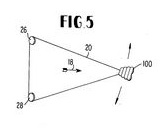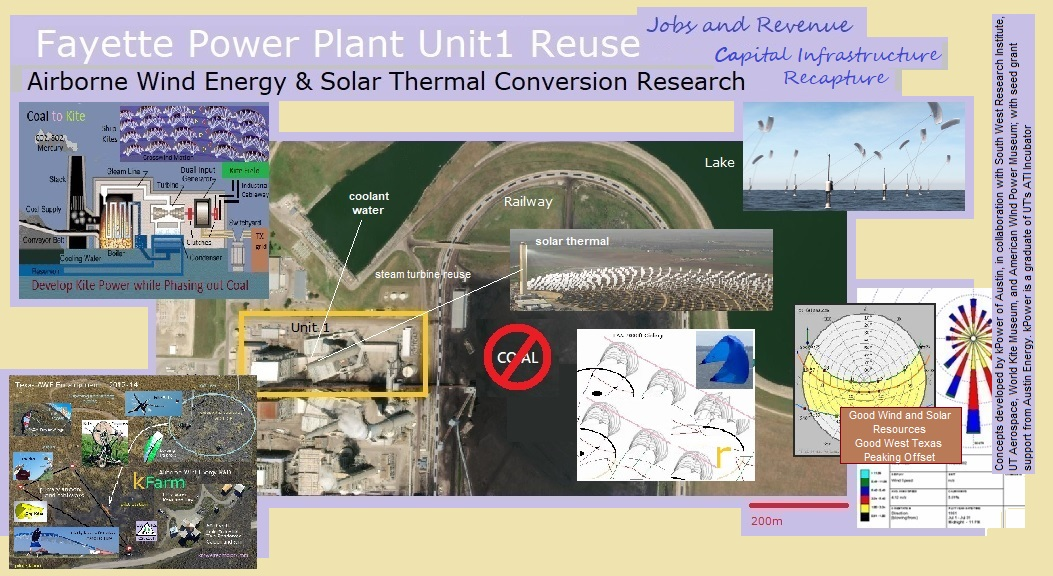Competing AWE Paradigms
- soft kites and kite networks
- single-line rigid-wing kiteplanes with eVTOL capability
- ?
- ?
Competing paradigms in Airborne Wind Energy
kPower
Tech Brief: Competing paradigms in Airborne Wind Energy
Upper
wind is a tremendous planetary-scale resource. Unfortunately, rigid
flying structure does not megascale well, under square-cube scaling law
and constant most-probable wind velocity. Nor do electric flight motors
scale well by power-to-mass, not just due to square-cube limits, but
ever slower thermal dissipation. Nor are single-line AWES kitefarm
"brush" topologies reliable or dense enough. Active autonomous flight
state-of-the-art is very brittle, nowhere near payback reliability.
A
superior AWES paradigm is Kite Networks as a megascale condensed-matter
metamaterial phase in the form of vast periodic lattices of tether and
fabric elements called "kite-matter". Wind can excite kite lattice
waves to in-principle pump PTO (power-take-off) lines to the surface,
whose kinetic energy can be aggregated by surface cableways to retrofit
existing power plants into synergistic AWE hybrids. During local wind
lulls, energy can be pumped back into the lattice to maintain flight
(aviation step-towing).
The
highest possible AWES power-to-mass is pure structural polymer "rag and
string" kept at its working load, comparable to the Space
Shuttle Engine by mass, but with no fuel and far longer service life.
Capex for polymer fabric and lines (~10USD kg) is far lower than
"drone" components (~100USD kg). In
just a few years single roll-stock mega-factory could output enough
polymer wing to power the world. Fabric
kites crash and pop right back up. Kite-planes crashing? Game-Over.
Except
for nav warning lights, nothing else is needed aloft. No control pod
mass, com-link dependence, and other high-complexity high-risk issues.
Control is as simple as passive dynamic stability of the kite-matter,
with only tuning and emergency kite-kill inputs needed. The
many-connected topology of an airborne kite network makes runaway kites
improbable. Inherently lower mass-density and velocity is far safer as
well.
Kite-matter
is identified as a true metamaterial. Kite-tether-anchor forces obey a
negative refractive index (of phonons). Traditional kite trains,
meshes, etc. clearly show auxetic and topological insulating (anyonic)
band-gap effects. The classic kite computes its own flight solutions by
embodied-computation under phononic quantum computing principles. All
flight is analog QM; the six common DOFs are all wave-function
oscillators. Aircraft motions inherently hunt around these axes, even
when the wave motion is unnoticed. Amplified Dutch-Roll figure-8s are a
major power mode. Sonic relativity is also prominent in in the elastic
lattice waves that kite-matter develops. Way too much background to
cover here.
Such
is the radical conceptual frontier of AWE, with lots of available
references and existence-proofs.
Below
are two soft-kite lattice-unit examples, a 1975 USP3987987 unit-kite
rig that does not unwind downwind to reel back in, and a passive
dynamic unit-kite demo; then a schematic concept poster integrating key
ideas; and finally a typical lattice wave animation to suggest coherent
megascale kitematter power waves.

Kite hybrid legacy plants, lowest capex to sustainability-
legacyplantSantos.jpg

 And
Andwave in lattice:
via GIPHY
The promise and challenges of airborne wind energy
06 Dec 2019 Margaret Harris "“Different” is a good word for it, and the harsh economics of off-grid energy mean that despite my knee-jerk initial assessment (basically, that the whole concept was as mad as a box of amphetamine-crazed frogs), I’ll go ahead and give airborne wind energy the benefit of the doubt, too"
She apparently did not have solid view of Payne's Fig. 5 nor network energy kiting. But some are informing her; watch for advances in her communications on AWE !